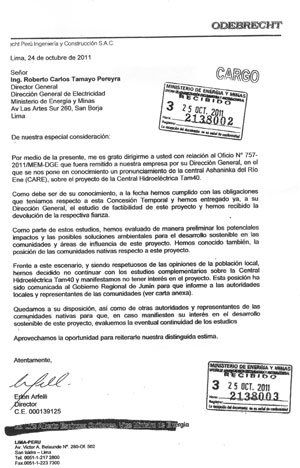A large Brazilian construction company has pulled out of a Peruvian dam project citing opposition from indigenous communities, reports International Rivers.
In a letter addressed to the Peruvian Ministry of Energy and Mines, Odebrecht said it was withdrawing from the 1278-megawatt Tambo-40 Dam on the Tambo River in the Peruvian Amazon. The company said it would “respect the opinion of local populations” in pulling out of the project, which would have affected some 14,000 indigenous people along the Tambo and Ene Rivers.
 Odebrecht letter. Click to enlarge. |
Odebrecht reached its decision after meeting with the Ashaninka of the Tambo River.
The move, which leaves the dam without a developer, was welcomed by Manuel Leon, an Ashaninka leader.
“We welcome this decision by Odebrecht to respect our rights,” he said. “We hope that other Brazilian dam builders will follow Odebrecht’s lead and make a similar decision.”
Ruth Buendia Mestoquiari, the President of Centro Ashaninka del Rio Ene, the representative indigenous Ashaninka organization of the Ene River), agreed.
“It is very important that Odebrecht have respected the desire of our communities to live in peace in the territory where we have always lived. Decisions like this one show that companies are willing to pass up projects with large impacts to local population and avoid unnecessary socio-environmental problems. We ask the Peruvian Government to stop granting concessions in our territory. We hope that the Ministry of Energy and Mines removes this project from its portfolio once and for all.”
The Ashaninka will now focus their efforts on Electrobrás — another Brazilian company — which is hoping to build another dam on the Tambo River.
Brazilian dam-builders are targeting dozens of rivers across the Amazon Basin. Much of their funding comes from Brazil’s development bank BNDES.
Related articles
Indigenous do not have right to free, prior and informed consultation on Amazon dam, rules Brazilian court
(11/09/2011) Indigenous communities do not have the right to free, prior and informed consultation on the Belo Monte dam because its infrastructure and reservoirs would not be physically located on tribal lands, ruled a Brazilian court.
Brazil boycotts OAS meeting after sharp human rights rebuke over giant Amazon dam
(10/27/2011) Brazil refused to attend a hearing convened by the Inter-American Commission on Human Rights (IACHR) of the Organization of American States (OAS) over the the controversial Belo Monte dam, reports Amazon Watch, a group campaigning against the hydroelectric project.
Peru cancels massive dam project after years of protests
(06/16/2011) Three years of sustained community opposition have brought down plans for a massive dam on the Madre de Dios River in Peru. Yesterday the Peruvian government announced it was terminating the contract with Empresa de Generación Eléctrica Amazonas Sur (Egasur) to build a 1.5 gigawatt dam, known as the Inambari Dam. The dam was one of six that were agreed upon between Peru and Brazil to supply the latter with energy.
Last chance to see: the Amazon’s Xingu River

(06/15/2011) Not far from where the great Amazon River drains into the Atlantic, it splits off into a wide tributary, at first a fat vertical lake that, when viewed from satellite, eventually slims down to a wild scrawl through the dark green of the Amazon. In all, this tributary races almost completely southward through the Brazilian Amazon for 1,230 miles (1,979 kilometers)—nearly as long as the Colorado River—until it peters out in the savannah of Mato Grosso. Called home by diverse indigenous tribes and unique species, this is the Xingu River.

(06/03/2011) As an American I know a lot about shame — the U.S. government and American companies have wrought appalling amounts of damage the world over. But as an admirer of Brazil’s recent progress toward an economy that recognizes the contributions of culture and the environment, this week’s decision to move forward on the Belo Monte dam came as a shock. Belo Monte undermines Brazil’s standing as a global leader on the environment. Recent gains in demarcating indigenous lands, reducing deforestation, developing Earth monitoring technologies, and enforcing environmental laws look more tenuous with a project that runs over indigenous rights and the environment.
Amazon mega-dam gets final approval
(06/01/2011) Brazilian authorities gave final approval to the controversial Belo Monte dam, reports AFP.